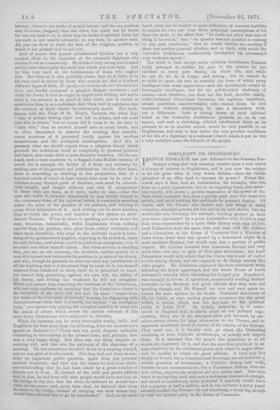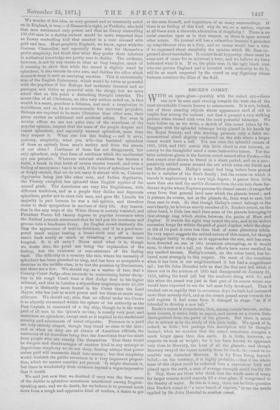SIMPLICITY OR SPLENDOUR?
pRINCE BISMARCK has just delivered to the German Par- liament a long and very amusing sermon upon a text which is always of interest to Englishmen, and is just now the subject in all our great cities of very warm debate,—does the visible splendour of an office tend to increase its power ? Prince Bis- marck says it does, that an Ambassador, for example, who can keep up a great appearance, live in an imposing hotel, and enter- tain royally, will create a greater impression of the power of the State which accredits him than a poorly-paid man who must live quietly, and avoid striking the multitude by personal display. Of course, said the Prince, who knows men and things in many countries, educated persons are not moved by such shows; but the multitudes are, Germany, for example, looming greater in their eyes when represented by a great Ambassador with £6,000 a year than when represented by a quiet little Envoy with only 2,4,000. Lord Palmerston held the same idea, and once told Mr. Cobden and a Committee of the House of Commons that a Minister of State whose front door was opened by a housemaid might be a most excellent Minister, but would soon lose a portion of public respect. Mr. Cobden retorted that American Envoys had very much their own way, in spite of their poor allowances ; but Lord Palmerston would ouly admit that the Union was a sort of enfant terrible among States, and not expected to do things exactly like other people. Mr. Gladstone expressed the same sentiment when defending the Royal appanages, and the whole House of Lords endorsed it recently when discussing the Judges' pay. Napoleon I. was strongly in favour of splendour, occasionally sending distinct reminders to his Marshals and great officials that they were not spending enough, and Mr. Disraeli has over and over again re- corded the same opinion in his books. Sustained stateliness of life, he thinks or says, excites popular reverence for the great nobles, a notion which was the key-note to the personal policy of Louis XIV. So widely, moreover, is it enter- tained in England that it affects much of our political orga- nization, being one of the strongest pleas put forward, by our- selves among others, for large allowances to the Throne, and an argument constantly beard in favour of the salaries of the Bishops. They must not, it is frankly said, go about like Dissenting ministers, or even Catholic Archbishops, or nobody will respect them. It is assumed that the people like splendour, or at all events are impressed by it, and that the awe thus produced is an easy substitute for the additional power with which it might other- wise be needful to clothe the great officials. A Czar may live simply, it is said, but a Constitutional Sovereign should maintain a certain grandeur of ceremonial ; a Catholic Bishop may walk, because he can excommunicate, but a Protestant Bishop, who can only advise, requires the artificial aid of a visible rank. One even hears in society that such and such a statesman does not do enough, and would be indefinitely more powerful if anybody would leave him a quarter or half a million, and in one instance a party paper actually scolded the Premier for not inhabiting a house big enough to hold the Liberal party in the House of Commons,
We wonder if this idea, so very general and so constantly acted on in England, is true,---if Bismarck is right, or Frederic, who held that men reverenced only power, and that an Envoy controlling 100,000 men in a shabby surtout would be more respected than an Envoy controlling half that number in a coat covered with gold and lace. Most people in England, we know, agree with. the German Chancellor, and especially those who for themselves prefer simplicity, but think that what they prefer their inferiors in sesthetical knowledge are pretty sure to dislike. The evidence, however, is not by any means so clear as they imagine, much of it seeming to show that while the crowd is slightly awed by splendour, it also resents its own awe, and dislikes the office which demands from it such an annoying emotion. This is undoubtedly true of the English Episcopacy, which would be twice as powerful with the populace if the Bishops had moderate incomes and no peerages, and thrice as powerful with the clergy, but we must admit that on this point a disturbing thought intrudes. The secret idea of all Christians, an idea very seldom acted on, is that wealth is a snare, grandeur a delusion, and rank a temptation to worldliness, and as, by an unreasonable but universal prejudice, Bishops are required to be more Christian than other men, their pomp excites an additional and artificial odium. But even in secular offices we are not quite sure of the soundness of the popular opinion, suspect that the mass of the people despise and resent splendour, and especially unusual splendour, more than they respect it. What else but this feeling call it envy, jealousy, simplicity, what you will—has banished splendour of dress so entirely from men's society and from the streets of our cities ? Costliness of dress has not disappeared, but only splendour, only that form of costliness which the uneducated eye can perceive. Wherever external stateliness has become a habit, a break in that habit of course creates remark, and even a feeling of annoyance ; but it is odd, if the love of splendour be real or deeply-rooted, that we do not carry it abroad with us, Colonial dignitaries being just like other men, and Indian dignitaries,
the Viceroy excepted, less splendid than English squires of the second grade. The Americans are very like Englishmen, with different traditions, and as a people they dislike and deprecate splendour, prefer not to elect rich men, and gave Mr. Lincoln his majority in part because he was a rail-splitter, and therefore closer to their sympathies in matters of daily life. Any innova- tion in the easy ways of the White House is acutely resented, and President Pierce fell twenty degrees in popular reverence when the Radical journals announced that he had put his coachman and grooms into a handsome livery. An English crowd distinctly dis- likes the appearance of well-to-doisliness, and if in a good-tem- pered mood enjoys tearing a broad-cloth coat off a decent man's back nearly as much as thrashing a policeman into hospital. It is all envy ? Never mind what it is, though we doubt that, the point not being the explanation of the feeling, but the existence or non-existence of the feeling itself. The difficulty in a country like this, where the necessity of splendour has been preached so long, and has been BO acceptable a doctrine to the middle-class, is to test the question by illustrations, but there are a few. We should say, as a matter of fact, that a County-Court Judge often succeeds in maintaining better discip- line in his rough Court than a Red Judge does in his higher tribunal, and that in London a stipendiary magistrate with £1,200 a year is distinctly more feared in his Court than the Lord Mayor, who has just as much power and ten times as much mag- nificence. We should say, also, that no official under the Crown Is so abjectly reverenced within the sphere of his authority as the Post Captain in command of a big ship, though he is the worst paid of all men in the queen's service, is usually very poor, and maintains no splendour, except such as is implied in the traditional severity and minuteness of naval etiquette. Foremen in a yard arc very strictly obeyed, though they stand so close to the men; and so when on duty are all classes of American officials, the testimony of all travellers being that the Americans bear too much from people who are exactly like themselves. That there would be dangers and disadvantages of another kind in any attempt at Republican simplicity we do not deny, fearing always that power unless paid will transmute itself into money ; but that simplicity would diminish the public reverence is a very important proposi- tion, which we cannot consider yet proved. It might diminish it, but there is wonderfully little evidence beyond a vague impression that it would.
We said just now that we doubted if envy was the first cause of the dislike to splendour sometimes manifested among English- speaking men, and we do doubt, for we believe it to proceed much more from a rough and oppressive kind of realism, a desire to get at the man himself, and impatience of so many surroundings. If there is no feeling of this kind, why do we, as a nation, express at all times such a theoretic admiration of simplicity ? There is no social coercion upon us in that respect, as there is upon several other points. No journal will lose a subscriber because it preaches up magnificence even as a duty, and no orator would lose a vote if he expressed about simplicity the opinion which Mr. Bass ex- pressed about teetotalism. It cannot be all hypocrisy ; there must be some sort of cause for so universal a tone, and we believe we have indicated what it is. If so, the plain man in the ugly black coat who can govern England and is invested with authority to do it, will be as much respected by the crowd as any dignitary whose footmen outshine the lilies of the field.



































 Previous page
Previous page